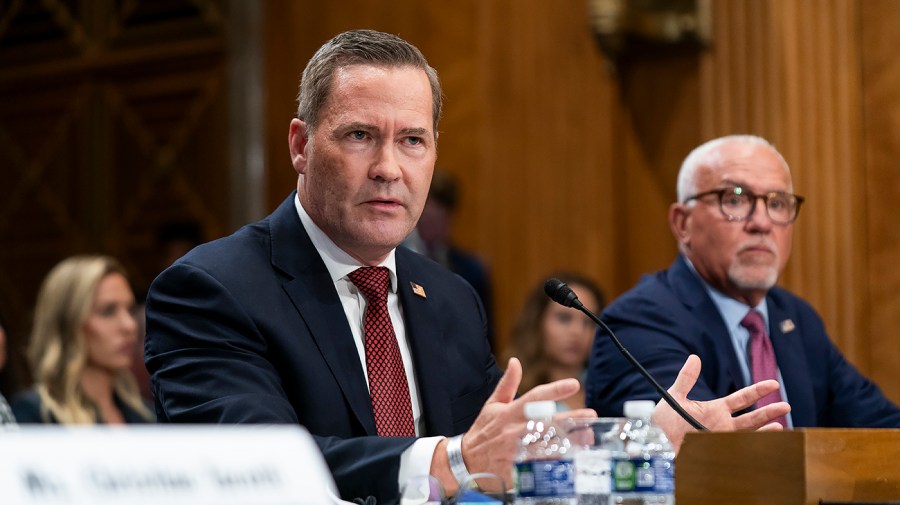Can Mike Waltz put ‘America First’ at the United Nations?

On Tuesday, Mike Waltz, President Trump’s former national security adviser, faced a grilling in the Senate as he seeks his next job: U.S. ambassador to the United Nations.
In his confirmation hearing, Waltz spun himself as a tough advocate for American interests. Yet he kept bumping up against the same dilemma: in spite of the robust “America First” rhetoric, the Trump administration is taking steps that will weaken American leverage at the U.N.
The stakes are high. The U.N. remains the world’s preeminent global forum, where countries gather to exchange views and set rules for the future. The central issues of our time — geopolitical competition, conflict, nuclear proliferation, global health and emerging technology — play out at the U.N. and its many agencies.
Yet the U.N. has struggled in recent years. Its Security Council has been deadlocked, with Russia using its veto to get away with an illegal war of aggression against Ukraine. China is increasingly throwing around its weight, demanding more influence in the organization and watering down the U.N.’s work on human rights. The U.N.’s bureaucracy has struggled to streamline and focus its work.
The war in Gaza has further challenged the organization. After Hamas’s Oct. 7, 2023 terrorist attacks in Israel, far too many countries at the U.N. refused to condemn the atrocity — a moral failure casting a long shadow. Since then, Israel’s brutal war on Gaza, including illegal obstruction of humanitarian assistance and obscene levels of civilian harm, has further poisoned the atmosphere.
Despite these challenges, decisions are still made at the U.N. every day that impact American interests at home and abroad. The organization also retains a great capacity to contain and end wars before they spread and require U.S. intervention. U.N. human rights monitors, while not perfect, help promote accountability for violations in places such as Iran, Sudan and North Korea.
Debates in U.N. technical bodies and standard-setting agencies affect many American economic sectors, such as telecommunications, biopharmaceutical research and agriculture. The U.N. is also playing a key role in establishing global rules and principles for the development and use of artificial intelligence.
While Trump complains about global freeloading, the U.N. is actually an effective burden-sharing mechanism. The U.N.’s 193 member countries pool their dues to tackle shared challenges, such as responding to humanitarian disasters. Countries come together to collectively fund and supply nearly 70,000 U.N. peacekeeping troops to help protect civilians and stabilize troubled regions.
Given the breadth of U.S. equities at stake, senators wanted to hear from Waltz a credible strategy to strengthen American leverage at the U.N. and enact needed reforms there. Every American, Republican and Democrat, agrees that the U.S., not our adversaries, should prevail in shaping outcomes at the U.N.
Waltz had a chance to explain how he would work there to promote peace and strengthen U.S. security, protect American jobs, spur innovation and advance American values, particularly human rights. But Waltz could not explain away Trump administration decisions that will make it much harder for any U.S. ambassador to stand up for American interests at the U.N.
For example, Trump has proposed that the U.S. cease paying its U.N. dues, which amount to around a quarter of the organization’s budget. In addition to gutting essential U.N. functions, this would create an opening for Beijing and other countries to expand their influence at the organization through stepped-up donations.
Trump’s withdrawal from U.N. bodies, such as the World Health Organization and Human Rights Council, has similarly abandoned the field to other countries, including those that do not share our values. You can’t fight for American interests if you’re not in the room.
Waltz’s job would also be much more difficult thanks to last week’s bloodbath at the State Department, where more than 1,300 national security professionals were fired without cause. The Trump administration claimed that this blow to U.S. diplomacy was about “efficiency” and “streamlining” — this is hogwash. These arbitrary and ill-conceived firings will unquestionably deprive our government of critical talent and expertise. Former U.S. Ambassador to the United Nations Susan Rice called the mass firings “superpower suicide,” as she imagined the champagne corks popping in Beijing and Moscow.
Ironically, Mike Waltz has been known as a “China hawk,” someone who has long believed that the United States is in a high-stakes competition with China. In his confirmation hearing, he emphasized that countering China at the U.N. is “absolutely is critical” — a view shared by both Democrats and Republicans. Yet, deep down, Waltz must surely realize that Trump’s actions will make it harder to push back on Beijing’s influence at the U.N.
Undermining U.S. alliances in East Asia through tariff threats? Firing U.S. national security experts and diplomats? Shuttering the Voice of America and other offices that communicate our messages to the world? Abruptly ending U.S.-provided life-saving humanitarian assistance? Collectively, these steps will weaken American leverage around the world — all to the benefit of China. Senators appropriately pressed Waltz to explain how these self-inflicted wounds would impact his work at the U.N. Waltz had few good answers.
It is now up to the U.S. Senate to determine whether Mike Waltz should serve in one of the most critical and high-profile diplomatic jobs. Senators will weigh many factors, including Waltz’s role in “Signalgate,” his shockingly poor decision to convene a classified discussion on an insecure messaging app. In line with standard Trump world protocol, Waltz refused to take any responsibility for the breach.
Just as critical, though, the Senate must respond to the gap between Waltz’s tough rhetoric and the Trump administration’s crippling of American diplomatic capacity. If Trump and Waltz truly believe in their “America First” rhetoric, they will need to do much more to stand up for our country.
Josh Black served in the Biden White House as special assistant to the president and senior director for multilateral affairs. He previously advised U.S. Ambassadors to the U.N. Susan Rice, Samantha Power and Linda Thomas-Greenfield.